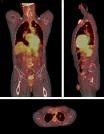
January 13, 2010 - Compared to computed tomography (CT), mammography and other commonly used tests, positron emission tomography-computed tomography (PET/CT) scans of the whole body may more accurately detect cancer in individuals with related neurologic disorders, according to a report posted online today that will appear in the March print issue of Archives of Neurology, one of the JAMA/Archives journals. Andrew McKeon, M.B., MRCPI, and colleagues at Mayo Clinic, Rochester, Minn., found paraneoplastic neurologic disorders occur in some people with cancer, including lung, breast or ovarian cancer, and may develop when cancer-fighting antibodies mistakenly attack cells in the nervous system. The researchers found that "patients with suspected paraneoplastic neurologic disorders, routine noninvasive oncologic evaluations may be unrevealing." The authors noted, "These standard evaluations include physical examination; computed tomography (CT) of the chest, abdomen and pelvis; mammography in women; and testicular ultrasonography and prostate-specific antigen testing in men." Cancers underlying paraneoplastic neurologic disorders are typically small, restricted to one site and are often not detected until autopsy. The researchers studied cases of 56 patients with suspected paraneoplastic neurologic disorders whose standard evaluations (including CT) did not reveal cancer. All of them underwent PET-CT at Mayo Clinic between 2005 and 2008. Prior to undergoing PET/CT exams, the patients underwent a median of three other screening tests; the most common was CT of the chest, abdomen and pelvis. In 39 percent of the patients, PET/CT detected abnormalities suggestive of cancer, of whom 18 percent had cancer diagnoses confirmed by biopsy or another method. Nine of the 10 were early-stage cancers, and detection facilitated early treatment. Cancer remission was reported in seven patients and improvement in neurologic symptoms in five patients after a median (midpoint) of 11 months of follow-up. While the authors noted they recognize the limitations of PET/CT, they said, "We favor this modality for initial oncologic evaluation of patients in whom a paraneoplastic neurologic disorder is strongly suspected. Elimination of whole-body imaging with CT alone before further imaging with PET/CT could reduce radiation exposure and the total financial burden of testing." Reference: Arch Neurol. 2010;67(3)]: doi:10.1001/archneurol.2009.336. For more information: jama-archives.org and http://archneur.ama-assn.org


 February 09, 2026
February 09, 2026 









